JOURNAL MEDIATION

in association with



in association with

At Regent’s University London our unique psychotherapeutic method of mediation training will equip you with a framework for conflict management and resolution crucial for dealing with commercial, employment, workplace, industrial, legal and personal disputes.

You will benefit from teaching provided by highly experienced tutors who are mediators from the psychotherapy and legal professions.
5 day course start dates: 8, 9, 14, 15, 16 July 23, 24, 29, 30 September and 1 October
PG certificate start dates: September and February
Students who successfully complete either course will achieve Accredited Mediator status.
In addition to a beautiful study location in Regent’s Park, we also offer bespoke in-house courses.

The 5 day course qualifies for Bar Council and Law Society approved CPD hours.
Open evenings: 21 June, 15 November
T: 020 7487 7505
Mediation and Alternative Dispute

(5 day course)
Postgraduate Certificate in Mediation and Conflict Resolution
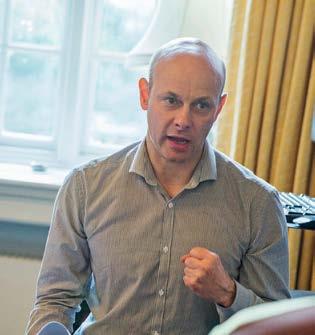



(part-time course)
Each year CEDR works globally across all sectors to improve communication, resolution capability and to manage conflict more effectively.
CEDR:
n prevents unnecessary conflict - by fostering and building negotiation expertise
n manages breakdowns in communication - with organisational change consultancy, dispute handling design and contract clauses
n resolves existing deadlock - with mediation, adjudication, arbitration and other services
n improves dispute resolution - through mediator training, education, campaign and consultancy
“Cut to the chase quicker than I had been used to.”
HR DIRECTOR
“After attending mediation courses at Harvard, London Business School and Singapore, this is the most effective conflict resolution course!”
DIRECTOR, INTERNATIONAL BANK
“Every organisation has its difficulties, CEDR essentially showed us we don’t have to just live with conflict, we can manage it.”
OPERATIONS DIRECTOR, GOVERNMENT AGENCY
Using the skills of mediation to handle tough situations at work
Leaders (from line mangers to CEOs) need to manage situations which can trigger tensions or anxieties, this can vary from inter-team dynamics through to challenges in decision making with senior management.
This practical course from experts in tough conversations provides indispensable skills for anyone with leadership responsibilities in order to be better able to work your way through tough choices and deal with uncomfortable situations.
At the end of the 3 day course participants will be able to:
n effectively resolve conflict and tensions at all levels within the organisation
n use CEDR’s framework for difficult conversations to manage dialogue effectively
n deal more comfortably and effectively with difficult people
n reflect on their own personal styles on dealing with conflict, diversity and challenge
For more information, email training@cedr.com
www.cedr.com/leadership
What a six months it has been since Issue 2!
The first two issues of the publication have made a significant impact in the industry resulting in our distribution rising from 32,000 to 84,000 over the course of 3 issues. One of our newest partnerships is with Acas who will be distributing the publication to spread the word of mediation here in the UK. The publication will also be distributed to 20,000 solicitors and legal professionals.
We are very pleased to welcome the Civil Mediation Council (CMC) on board as our Association Partner; the CMC is the leading association for mediation in England and Wales and supports the raising of awareness of mediation in Workplace, Employment, Civil and Commercial areas, amongst others. The CMC have now set up a dedicated Workplace and Employment Group to ensure a firm representation for workplace mediators within the CMC, more about this can be found on page 25.

Feedback from our readers has been very positive, with business leaders recognising the importance of mediation not only for workplace disputes but also for wider commercial issues, as a way of avoiding costly litigation. In this issue you’ll notice an expanded focus into commercial mediation in our articles.
Mediation is excellent at resolving destructive disputes, and whilst ever present, conflict can be constructive to necessary change. However, one thing we get asked is how can organisations prevent these disputes becoming destructive in the first place. Mediation skills transfer well to management and more tips on preventing destructive conflict can be found on page 11.
We also look at the relevance of fairness in relation to dispute resolution. See the results of an interesting experiment with capuchin monkeys and look at how “it’s not fair!” is something entrenched in us all on page 16.
For all of you attending the Mediation for Business event in London on 24th June, we look forward to seeing you there. For more information about the event please do not hesitate to get in contact.
Hannah Randolph UK Mediation JournalPage 5 >> Welcome Sir Alan Ward, Chair, Civil Mediation Council
Page 7 >> In ConversationHow Effective is Mediation?
Page 8 >> Should you set up an internal mediation service or use external mediators?
Page 11 >> Nip it in the Bud
Page 15 >> Mediation and Early Conciliation: What’s the difference?
Page 16 >> Intransigence and Impasse in Mediation and Negotiation
Page 17 >> Independent Mediators Limited
Page 18 >> Using Mediation to Improve Employee Relations and Patient Care - A Case Study from Birmingham and Solihull NHS
Page 21 >> Workplace Mediation - A Last Resort?
Page 23 >> London HR Summit celebrates 10 years of success
Page 24 >> Taking ADR to Westminster
Page 25 >> CMC Workplace & Employment Group
Page 27 >> Meet Louise and Deborah - blog by Philippa News, Acas Senior Advisor
Page 28 >> CMC Membership Choices
Page 30 >> The Mediation Conundrum
Page 33 >> The 10th Annual CMC Conference – May 2016 “Meeting Needs – Making Life Better”
Page 34 >> Research Shows that Mediation Continues to Grow and Make a Positive Difference
Page 36 >> Mediation in ICU
Page 37 >> Mediators’ New Breakfast Club
Page 38 >> Mediate Your Dispute! – The Best Option
Page 39 >> Directory Mediation & Training Providers
Whilst every care has been taken in compiling this publication, and the statements contained herein are believed to be correct, the publishers do not accept any liability or responsibility for inaccuracies or omissions. Reproduction of any part of this publication is strictly forbidden. We do not endorse, nor is Iconic Media Solutions Ltd affiliated with any company or organisation listed within. It is advised before appointing a mediator or trainer that you carry out your own quality and competence checks.








Over the last two years, the Civil Mediation Council has made many changes to the structure and operations in order to bring the organisation to the right place for significant growth and influence in the realisation of our vision and purpose.
One of the most recent changes is the association with this magazine for 2016. The shared aim of the partnership between the Civil Mediation Council and the UK Mediation Journal brand is to promote mediation to the end user and to educate those who would like to better understand the benefits of using mediation for their businesses, employees and their communities.
With a growing distribution of 84,000 and with a strong emphasis on mediation, the U.K. Mediation Journal offers the CMC a strong and effective platform to develop its outward communication for the benefit of its members and the potential mediation user. The partnership will allow for the Civil Mediation Council to communicate key messages and contribute editorial via the UK Mediation Journal’s various platforms throughout the year including conferences and social media.
This Summer, the CMC will launch its new website which will include an online membership portal and an up to date register of CMC Registered Mediators for Workplace as well as Civil and Commercial mediators, providing a primary filter for the choice of mediator. Members, new and long-standing, can look forward to a revitalised and relevant organisation to represent and support their own aims, be they for their businesses, communities or careers.

We look forward to welcoming you to our ‘community’ and to sharing our energy and commitment in service of effective dispute resolution across society.

As external, neutral fact finders using mediation techniques we can help... we:

are unbiased and external , so better able to engage with all parties from 2 to 40+ people get results by identifying root causes of issues intervene swiftly and effectively to avoid lost productivity, neutralise escalating conflict and control legal costs help you retain valuable, skilled personnel.
Call Focus Mediation, the leading Workplace Mediation and Enquiry specialists, today and resolve your complex workplace issues quickly and amicably.
Call: 01908 410 506
Visit: www.focus-mediation.co.uk
“We had widespread dissatisfaction and breakdown of trust between management and staff. Focus Mediation quickly found out what all the issues were.
They held individual, group and whole division meetings to develop a wide scale change programme. Focus Mediation guided staff through their programme over several months to help achieve the outcomes desired by all.”



Martin Banham-Hall LLB, Civil Mediation Council registered mediator at Focus Commercial Mediation www.focus-mediation.co.uk and Senior Partner at commercial law firm Heald Solicitors LLP www.healdlaw.com in conversation with Steve McQuillan, CEO of Avingtrans PLC www.avingtrans.plc.uk


Steve:
What percentage of the time would you say that mediation is successful?
Martin:
Most cases settle. My own experience is well over 90%. Even in cases that don’t settle on the day, the gap between the parties is often greatly narrowed. A settlement by bilateral negotiation may then be achieved sooner than it otherwise would.
Steve:
When is the optimum time to initiate mediation?

Martin:
Often, parties who settle in mediation wish they had engaged in the process earlier, but hindsight is a wonderful thing!
Mediation can only happen if both parties agree. The optimum time is probably the earliest point when both parties are willing to try it, and acknowledge that help from a neutral third party may facilitate a negotiated outcome. The earlier the mediation, the greater the potential saving of legal costs, management time and lost productivity.
Steve:
How do you see mediation evolving? Will we see a time when it becomes compulsory?
Martin:
The courts are already frustrated that cases are still litigated with legal costs disproportionate to the sums in dispute. Judges continually urge parties to resolve their differences by mediation. New rules enable courts to sanction those who refuse, and after a slow start these sanctions have been applied in a few cases. Ideally, take-up of mediation would remain voluntary as public awareness of the benefits leads more disputing parties to demand it. In practice that process is slow, hampered by some with vested interests who fear mediation will diminish the market for legal services. In the family courts, parties must explore mediation with
an accredited mediator before engaging in litigation. They are not compelled to mediate, but voluntary take-up after this exploration meeting is far higher. A corresponding arrangement, or compulsory referral to an exploration meeting where legal costs reach a certain proportion of the amount in dispute, would boost mediated settlements in civil and commercial cases.
Steve:
Martin:
A common explanation for declining mediation is that the parties think they’re too far apart for it to succeed – invariably because the other side is so unreasonable!
The reality is, the wider the gulf – financial, emotional or otherwise – the greater the need for a trained, neutral mediator to help bridge it. I have successfully mediated cases where the parties could not bear to be in the same room, let alone have a civilised discussion about their dispute.
The alternative is generally worse. The legal process tends to polarise parties’ positions until, ultimately, a decision is imposed on them. Too often, settlements outside mediation are driven by the realisation that legal costs and the distraction of managing the dispute have already mounted out of control.
The junior doctors’ dispute recently highlighted the power of mediation to resolve deeply entrenched opposing views – is there any type of dispute where mediation would not improve the outcome?

You know you want to introduce mediation into your business, but how? Should mediation be delivered by internal mediators, or outsourced? It’s a costly mistake to get wrong. These questions help you identify the right option – the more ‘yes’ responses, the more likely it is that an in-house service is the right option for your organisation.
Where your staff survey indicates people don’t raise bullying concerns because they believe ‘nothing will be done’ and staff consider “it’s not what you know, but who you know”, the culture may be less receptive to internal mediators.
Internal mediators may be seen as ‘a company body’ – lacking independence and open to pressure to divulge information to senior managers. The perception of an internal mediation service can be affected by views on where it reports to within the organisation; the people who are selected as mediators; the communication and the employee engagement process.
External mediators can be viewed as an independent safe pair of hands, or staff may view them as an outsider who cannot understand the history, nuances, hierarchies, technical details and hidden agendas.
An internal mediation service is a visible statement that your organisation will support people in being accountable and responsible for resolving their differences.
Is there the time and determination to establish a mediation service with its own identity?

Do the majority of employees say the organisation is not “political”?
Is the structure complex with technical factors that determine what can and can’t be changed?
Are senior management on board with mediation?
Are there low levels of conflict at senior levels?
Are people in charge of their own calendars and able to take ti me out of their day job at short notice?
Are there high levels of simmering, unspoken conflicts?
Does your staff survey show people not voicing bullying and har assment concerns or speaking out when witnessing such behaviours?
An in-house course is usually run for eight mediators, and costs around £10,000 while an external mediation is between £800 and £1,500, meaning ten cases a year makes internal mediation cost-effective. However, mediators should mediate more than four times yearly to avoid skill fade and declining confidence: eight co-mediators will need 16 cases.
Is there £10,000 for the initial mediation training?
Can you anticipate more than 16 referrals to mediation a year?

Is there management and ongoing investment for internal mediato rs?
Is the HR budget centrally managed?
Is there over 2,500 staff?
Is there considerable change and restructure?
A well-run internal mediation service benefits your organisation more widely than just mediation cases, as the skills are present to defuse situations informally and at every interaction before problems get too complex and entrenched. And it can be argued that there is no longterm gain in calling in external mediators, who complete the mediation and interact with a relatively small number of people. There might be a small amount of skills transference to the parties involved, but their impact outside of the individual case is limited. But it is possible to make an informed decision after considering all the angles.
CMP has supported many organisations to work through these areas and to go on to implement the right mediation service for them, either through setting up an internal mediation service or via CMP’s independent mediators, See Bruno’s case study on Page 18.

“CMP always go the extra mile because in addition to the training and accreditation package we also got support with difficult situations and participation in a network of mediators across the Public and Private sector where good practise was shared and in some cases mediators worked across organisations delivering a consistent standard model.”
Head of Welfare, HM Revenue and Customs
For more information about how we can support you, come and see us on our stand at Mediation for Business or contact:
Richard Peachey
t: 01763 852 225
e: richard.peachey@cmpresolutions.co.uk www.cmpresolutions.co.uk



• Helps reach a much quicker solution
• Reduces cost to you/your business
• Helps you preserve business relationships
• Could create extra value for all concerned
• Lets you get on with other business
• Better for reputation
• Can rebuild important bridges
• You control the outcome
• You manage risk more effectively
INTERESTED IN TRAINING IN MEDIATION SKILLS?
CORE’S RESIDENTIAL SUMMER SCHOOL
“It is the best training course I have been on in twenty years, and well worth the price.”
“Positive and inspiring... it should be compulsory”
“Without a doubt the most energising, fulfilling, thought-provoking and challenging course I have ever attended”
Scotland’s pre-eminent mediation service for commercial, financial and professional disputes and conflicts Quick, cost effective and forward-looking approaches to dealing with business difficulties
This is a world-class course, at a world-class venue, for leaders who are seeking to gain the edge by enhancing their communication, negotiation and conflict resolution skills.
Core’s Residential Summer School*: Using Mediation Skills as a Leader
Venue: the superb Blair Estate (pictured above), 20 minutes from Glasgow Airport
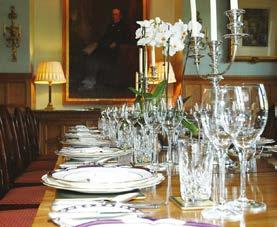


28 - 31 August 2016 (CPD: 24hrs +)
Module 2: Building Mediator Competence
27-28 October 2016 (CPD: 16hrs +)
Module 3: Assessment
3-4 November 2016 (CPD: 20hrs)
*Note that the Summer School is available as a free standing three day course. The Summer School is also a prerequisite, as Module 1, for attending modules 2 & 3
For details of Core’s mediation services and to register for our Summer School, contact Miriam Haboubi at 0131 524 8188 or Miriam.Haboubi@core-solutions.com www.core-solutions.com

Little things can trigger major conflict in management and the workplace, with effects on morale, productivity, business effectiveness and profitability. Drawing on insights from his experience as a senior mediator, John Sturrock QC , Chief Executive of Core Solutions, discusses ways to minimise the risks of these things happening in the first place and of nipping them in the bud.


Carol had held a senior position in the company for a number of years. Eric was nominally her line manager but in practice they looked after their own areas of interest and interacted infrequently. Carol was slightly put out that she had not been promoted to Ian’s level but accepted that the flexibility she had to work from home and visit clients at times of her choosing was a benefit which she might not have if she was promoted. She did wonder if Eric had in some way influenced management not to promote her. She had never voiced that thought.
Eric was slightly older and going through a number of health and other issues at home. He was a proud man and gained his sense of purpose from his job. He did not talk about personal matters at work and could come across as rather private. He was respected rather than loved in his role. He was slightly wary of Carol who was more outgoing than he.
One evening, as she was about to leave the office after an exceptionally difficult day with a key client, Carol received a phone call from Eric. He asked her about a report on another important customer which she had been tasked to complete. Slightly flustered as she knew the report was a day late, Carol said that she would get it to
him as soon as she could. Eric replied: “The report needs to be on my desk tomorrow morning… otherwise there will be consequences for…” Carol didn’t hear the rest. There was something in Eric’s stern voice which she took as threatening. She put the phone down and left for the evening. The incident played on her mind that night, so much that she did not sleep well. She called in sick the next day.
Eric had been surprised that Carol had put the phone down so quickly as he was about to explain that he was being pressed by his director to have the report ready. The director was very target-driven and the culture of the department could seem pressurised and impersonal at times like this. Eric was even more surprised when Carol did not turn up at work the following day…
Nine months later, Eric and Carol were in adjacent rooms as the mediator shuttled between them. They had not yet been able to face each other that day, not having spoken since the ‘phone call’. Carol’s claim was pending in the Employment Tribunal and she had been signed off by her GP for another four weeks. The firm’s occupational health specialist had suggested she might never be able to return to her previous job. The company lawyer, sitting in Eric’s room, had accepted to the mediator that some of the early correspondence she had sent to Carol had
been rather inflammatory, repeating accusations from another member of staff about Carol’s apparent lack of cooperation when working from home. Eric was distressed. The last several months had been a nightmare. He had lost a senior colleague, that report had eventually been completed (by him), his director was barely speaking to him, his health was suffering, and his life-partner had said if he didn’t shape up, he would be left on his own.
It was only when the lawyer, with the mediator’s guidance, made a fulsome apology for the letters, and the way the company had handled the whole matter generally, that Carol’s journey to recovery really began. Correspondingly, Eric began to feel he had turned a corner too when Carol said that she did not really blame him, it had just got out of hand quickly…
A familiar scenario? I suspect so. They say there are only five or six story lines in Hollywood. In my experience, there are only five or six (at most) themes in most conflicts which arise at work. The facts and the people are different of course, but the underlying issues and psychological, business and relationship impacts are very similar. Indeed, I could tweak this fact pattern marginally and reflect countless different mediation or conflict situations which I, and many of you, will have experienced.
• A slightly uneasy or distant personal relationship among fellow employees
• Lack of, or poor, communication in a department or team
• A culture which does not encourage openness and mutual support
• A relatively trivial incident which is perceived very differently by the players and escalates quickly
• Assumptions and judgments made in haste, based on perceptions and previous experiences
• Poor handling of the initial situation by others
• Inflammation by lawyers or others handling complaints, doing what they think is their job
• Make building a culture of openness, good internal relationships and effective communication central to its business planning
• Offer training to staff to spot early signs of relationship – or communication – breakdown and introduce a without-blame or shame, nip-it-in-thebud, safety valve mechanism
• Ensure that senior managers are trained in mediation and conflict handling as an essential part of their job description
• Employ lawyers and advisers who have a finelytuned sense of how to find solutions and who do not merely revert to binary, adversarial approaches
• Build in mediation and facilitation alongside, or ahead of, formal disciplinary and grievance procedures
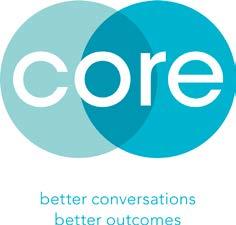
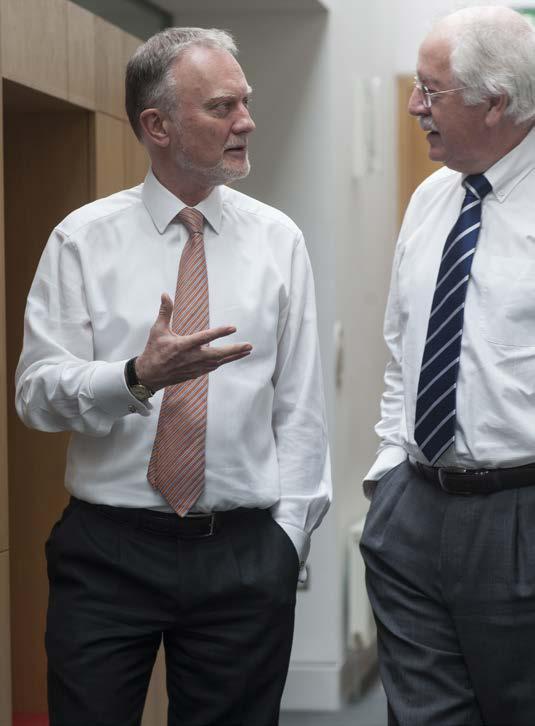
• Bring in an external mediator if internal methods don’t resolve things quickly.



We recognise that an organisation is only as successful as its relationships.
We are recognised in the legal directories as providing high-quality facilitation and mediation services for the widest range of workplace and employment disputes.

We use practitioners experienced in coaching, mediation and facilitation, psychotherapy and supervision to maximise your chances of resolution and preserve relationships in the workplace.
020 7378 9453
caroline@sheridanresolutions.com sheridanresolutions.com

Conflict at work is a costly business. It can happen in any workplace. Differences between individuals at work can lead to grievances, absences and loss of valuable employees.
Mediation helps people who don’t see eye to eye to sort out their differences as quickly as possible and so minimise distress and cost.
The Acas Certificate in Internal Workplace Mediation draws upon decades of Acas experience in handling workplace disputes, grievances and conflict.
This fully accredited course equips your managers with the skills to become effective workplace mediators, helping to reduce conflict, increase productivity and re-energise employee engagement in the workplace.
Disputes at work can cause upset, create stress and be a distraction from the job. Left to fester, they could lead to absences and even resignations, meaning the loss of valuable people, not to mention low productivity and morale. It’s important to act quickly to resolve a dispute, but if this can’t be done between the parties themselves, then bringing in a neutral third person is often the best way to handle it.
Acas’ Mediation and Early Conciliation services are often the best ways to resolve disputes and prevent the costly process and disruption of going through a tribunal claim. But what are the differences between Mediation and Early Conciliation?

Mediation seeks to rebuild and repair an employment relationship through an impartial and independent intermediary. Mediation is informal and sits outside of an employee’s formal performance review. It’s confidential and both parties enter into it voluntarily.


Early Conciliation seeks to help to settle a dispute without going to court. Whilst prospective claimants are legally
required to contact us for a conciliation certificate before making a tribunal claim, they only need to take part in discussing the matter and attempt to resolve it if they want to and either they or the employer can stop the process at any time.
Acas’ Early Conciliation service is:
• Free: There is no charge for our service.
• Impartial: Acas doesn’t represent either the employee or the employer.

• Independent: Acas is not part of the tribunal system.
• Confidential: What you tell us can only be discussed with the other party if you agree that it will be helpful in trying to settle your case. Whatever is discussed during the course of conciliation cannot be used by either party at a tribunal hearing.
You can get free advice at www.acas.org.uk
 By Paul Randolph
By Paul Randolph
Intransigence in disputes always has a reason and a purpose. If we can understand that the reason is invariably connected to the perceptions we have of our selves and the other party, we may be better able to overcome impasse.
We enter a dispute usually out of a deep sense of injustice: our perception of the other party is that their behaviour has been unreasonable, their conduct unacceptable, and their position inexplicable. Whilst this perception remains, we are unlikely to shift our own position. Similarly, our perception of ourselves is that we are right, that we have been utterly reasonable, and our own conduct beyond reproach. Our self esteem therefore requires that we be vindicated – that we are proved to be right and the other side shown to be wrong.
That is why we feel it so important that the other party admits liability, accepts responsibility, and ideally apologises. Until they do so, we have not been adequately vindicated and we remain a victim of injustice. We therefore will not budge until the other party begins to accept some responsibility.
Our purpose in such intransigence is to address our own self esteem. “We will not be a ‘patsy’ or a ‘roll-over’; we will not wish to see them ‘laugh all the way to the bank’; we will not permit them to believe they have won: “Who do they take us for?” It thus becomes a ‘matter of principal’ not to shift one’s position or begin to compromise until some level of vindication has been achieved.
Our sense of fairness and desire for justice is so powerful that we will sacrifice a good position rather than fall victim to an injustice. This has been vividly illustrated by an experiment conducted with capuchin monkeys. Two monkeys are placed in separate cages side by side. Each monkey is given a piece of cucumber which they happily receive as a reward for a task they complete satisfactorily. One monkey is then given a grape (much nicer than cucumber!) and the second monkey sees this. The second monkey angrily rejects the cucumber, hurling it back in rage at the experimenter, and proceeds violently to shake the cage in anger. This reflects the reaction of a party who perceives a gross unfairness in mediation or negotiation. It demonstrates the adamant intransigence that we so often see in parties: one will not accept a perfectly acceptable offer whilst the other is believed to be securing an unfair advantage: our self esteem will not allow us to be humiliated by an injustice.
The impasse that this type of situation produces is, regrettably, all too typical in many of the disputes confronting mediators. But by addressing the parties’ perceptions, and empathetically demonstrating an understanding of their frustration, a good mediator can defuse the irritation and enable them to ‘move on’.



Independent Mediators Limited is a group of leading, full time commercial mediators whose independent practices are centrally managed. The company operates both in the UK and internationally.
Independent Mediators (IM) was formally launched in June 2007. We operate as a mediation chambers. All the mediators work full time as mediators and are only appointed through Independent Mediators.




Our chambers consists of Charles Dodson, Phillip Howell-Richardson, Kate Jackson, Michel Kallipetis QC, Jonathan Lloyd-Jones, Mark Lomas QC, Bill Marsh, Andrew Paton and Nicholas Pryor.

When forming IM our aim was to make the process of instructing mediators simpler and to recognise and to meet the requirements of instructing solicitors and individuals. We are very conscious of the need to provide a competitive service and are recognised as offering exceptional value for money. We make the country’s top mediators available at affordable prices for any size dispute. We do not charge any admin fees to the parties.
Only mediators recognised by the leading directories as being in the top tiers of UK mediators are invited to become members of Independent Mediators. We are unashamedly “elitist” offering some of the best mediators in Europe. We will never offer an inappropriate mediator for any instruction.




The concept has worked extraordinarily well. Instructing solicitor’s feedback shows that not only was our business model correct but that the quality of the mediators’ performance and the administrative service that supports them has probably exceeded expectations.
The number of mediations per year has consistently increased since our launch and now numbers 500+ per year. Since we launched the group we have received in excess of 3750 appointments.
The parties to cases IM members mediate range from litigants in person to multinational companies; with sums claimed from £25k to multi billion.
Appointments are received from a broad range of sources including, top ten City firms, international law firms, regional and high street practices, increasingly from inhouse lawyers, government departments, security services, local authorities, police forces and litigants in person.
The subjects mediated, to name a few categories, cover all aspects of commercial/financial services/banking/ employment/professional negligence/regulatory/class actions and insurance disputes.
Our appointments are increasingly from international sources with the number growing each year. Instructions from lawyers, clients and governments along with training and consultancy means our mediators have worked with over 85 countries worldwide. Following the implementation of the European Mediation Directive we took the decision to recognise the mediators experience and to offer our services to a wider audience who may wish to take advantage of the combined expertise in the growing areas of International/Cross Border/Multiparty disputes.
Our international presence has been identified by the international directory Who’s Who Legal: Mediation. They acknowledge IM as a leading mediation chambers recognised for the excellence of their specialists.
Birmingham and Solihull Mental Health NHS Foundation Trust is one of the largest in the country, employing over 4,000 staff across more than 50 locations. Its internal mediation service is embedded in the Employee Relations department, and comprises 10 trained mediators from a range of backgrounds and grades and both clinical and non-clinical staff.
Need
• To improve employee relations within the Trust and so reduce the number of disciplinary and formal bullying/harassment complaints
• To provide employees with an informal dispute resolution option, thus providing better support to parties in conflict and reducing the risk of internal disputes impairing patient care
Deliverables
• Consultancy advice around:
- Mediator recruitment and selection

- Service promotion and administration
- Monitoring and evaluation
• 6-day ILM-certificated training programme for 10 mediators
• 12-month post-training
• Better support for conflicted parties, resulting in improved employee relations and reduced patient risk
• Less managerial time spent dealing with conflict
• Reduced conflict-related absence and better B & H staff survey results
• Improved capacity to resolve internal disputes quickly, delivering ‘win-win’ outcomes
The annual NHS Staff Survey highlights the need for all NHS organisations to create a positive working environment that listens to frontline staff, tackles bullying and discrimination, reduces stress and promotes health and positive mental wellbeing. Research also indicates that poorly motivated and supported staff have a negative impact on patient care and outcomes.
Birmingham and Solihull Mental Health NHS Foundation Trust therefore needed to ensure that their staff had high levels of confidence in the employee relations process and felt well supported when reporting their issues.
The Trust has a long experience of the informal use of mediation techniques, but wanted to integrate mediation formally into their Employee Relations toolkit and ensure that it was delivered professionally and consistently. They selected CMP Resolutions to establish a mediator pool of staff that was well-trained and able to provide a confidential service to resolve relationship issues for individuals and teams. In doing so, they anticipated:
• Reducing the number of employee relation cases being investigated and leading to disciplinary action
• Reducing the time taken to resolve employee relation issues
• Improving the ability of some managers to have difficult conversations with their staff
• Increasing the informal options included in the disciplinary and grievance process
• Reducing the number of cases being brought to the attention of the Trust’s Bullying and Harassment Advisors
• Improving the results of the Staff Survey and reducing the number of staff reporting that they had been subject to bullying or harassment
The mediation consultant spent time getting to understand the Trust and its policies. Because the Trust recognised it was important to find individuals with the right attitude and core skills, as well as people who will have time to carry out their mediation work alongside their day-to-day
role, the training provider offered advice and support in selecting and recruiting the people who were to be trained. They also provided materials and information about the administration of the service, as well as advice on how to communicate it internally and establish it as a mainstream opportunity for informal conflict resolution.
The Trust decided that mediation should be accessible through a variety of routes. It can be commissioned through the HR Support Team or the Senior Equality and Diversity Lead (the use of the Senior Equality and Diversity Lead adds an additional layer of confidentiality if mediation is being conducted with the HR team members) as well as requested by line managers or the parties themselves.
The training provider offered advice on the monitoring and evaluation of mediation so the service could maintain high operational standards and demonstrate its ability to deliver cost savings to the Trust.

Those selected were trained and assessed on an ILM endorsed national certificate in mediation, over six days, after which the delegates completed a post-course pack which was also assessed. Successful trainees were then accredited to co-mediate on Trust cases. The training provider included a year’s support for the Trust and its mediators, so they could access immediate expert support for any case or service challenges.
• Mediation success rate is currently running at 100%
• The savings made in the cost of casework (time/ resources/HR support) that would otherwise have been involved in managing the cases that have reached the mediation service are estimated at around £78,000 in the first year alone
• The service carries out around one mediation a month, the majority of which involve two parties. Parties come from senior clinicians, to corporate and operational staff

• In total 29 people have participated in mediation, with most mediations taking place within four working weeks of referral. The parties have been positive about their experience of mediation: “The process was most helpful; I felt the world had been lifted from my shoulders, I really did”
• This has been achieved with little impact on the dayto-day job held by the mediators and the parties concerned, saving the Trust the time and resource of long drawn out investigations and possible disciplinary action
• Bruno Daniel, the Trust’s HR lead on this project says: “The cost of carrying out investigations and disciplinaries far exceeds the cost of undertaking mediations, and the outcomes are far more suitable to a working environment where staff can flourish and do the best for their patients. In addition, a number of the mediators have been promoted which shows there is an added benefit of developing those staff who take part in the process.”
• Bruno also believes that the service could be an “income generator” and is exploring how the Trust can work in partnership with other Trusts across the West Midlands and charge for its services

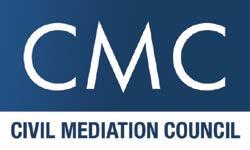


Iwasn’t quite sure I liked being referred to as “a last resort.” However, I was honored to be asked to conduct this mediation, last resort or not.
I received the call from a local union representative who quickly asked “Hey, aren’t you that guy who does mediation on old grievances?” I answered that I guessed I was. How could I help?
“We have a ton of grievances filed on the same subject and the company and their lawyers have been dragging this thing out now for over three years. I’ve got people who are being ripped off as a result, and so you are my last resort.” Hmmm.
I called the employer’s representatives and they agreed to join in the mediation, although they expected failure because “the union hasn’t been reasonable.”
Within ten hours of discussion the participants had found their solution. And the agreement was acceptable to all parties, including their respective attorneys (who worked hard to set aside their combative instincts and find mutual interest).
This three and a half year old stalemate (with endless stalls in scheduling arbitration) did have some common ground. And the common ground had been there all along - ironically noted in the record from three years earlier. However, that common ground had to be rediscovered. Why? People had stubbornly assumed their positions, hunkered down and lost sight of reason. The tactics and strategies that ensued unfortunately became personal. Egos were not going to be bruised.
By finally taking a deep breath, relaxing and asking for neutral guidance, the participants revived the core issues. They set aside their history of gaming each other and went to work. Combat turned into teamwork.
Relationships are complex, often irrational and almost always emotional. So, full disclosure: workplace mediation doesn’t claim to resolve the nature of our interactions. But experience has shown me that workplace mediation can put rivalries on a course toward mutual gain.
Why do people wait so long to give mediation a chance? Is it because workplace mediation is relatively unknown as a viable option? Is it because we believe we are capable of eventually reaching our own resolution, regardless of how long it takes, and of doing so without assistance? Or do we actually prefer the familiarity of stalled talks
 By Thornton Mason
By Thornton Mason
and the old chants of “they just won’t work with us?“ Is it because there are some people who gain more from disagreement than from agreement? I would prefer to see workplace mediation inserted into the formal employee complaint mix more permanently – before a lack of progress occurs on any given matter. And I’ll continue to work for that.
In the meantime, I take these successful experiences as they come, case by case. Even if I have to be known as the last resort.
Over its 10 year lifespan, the Summit has evolved massively; an additional day of seminars, incorporation of a one day conference and now hosting an exclusive gala dinner which expands opportunities to network.

Thanks to our unique formula of meetings, networking and business development opportunities, over 22,750 connections have been made throughout the past decade.


For more information, please get in touch with Frances Lee on:


















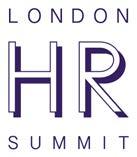
Launched by Forum Events in 2006, the London HR Summit celebrates its 10th anniversary this September. Over its 10 year lifespan, the event has consistently brought together prominent industry figures, keynote speakers and some of the biggest names in the industry for an unparalleled two days of face-toface meetings, educational seminars and networking. Going from strength to strength; the London HR Summit has become a leading platform for HR professionals to get together to learn, share, network and engage on the latest trends, developments and innovations in the industry – and it’s more than fair to say it has been a successful decade.
Since its debut, the London HR Summit has hosted some of the biggest household names including Air France, BBC, Jaguar Land Rover, the Ministry of Justice, Santander, Waitrose, and more, year on year. The event’s popularity has led to some ambitious expansion plans; seeing through the launch of the Manchester HR Summit in 2013 and making its debut in Edinburgh this April, the Scotland HR Summit.
The London HR Summit makes a celebratory return with its most anticipated event so far at the Radisson Blu Hotel, London Stansted on the 26th and 27th September. The event is designed to draw on the combined skills, knowledge and expertise of the HR community to share and develop coherent strategies to maximise resources and staff performance.
Offering invaluable insight to senior HR professionals; the London HR Summit provides unparalleled industry access to the latest products and services; arming HR departments with the best tools allowing organisations to operate successfully and efficiently. The London HR Summit aims to maximise productivity by using a unique matchmaking formula to bring delegates and the most innovative product and service providers together for a series of face-to-face meetings.
Featuring a comprehensive seminar programme and roundtable discussions, this year’s Summit will be welcoming prominent industry influencers, including keynote speakers from the Institute of Employment Studies, Labovitch Consulting, LeadTheFuture and Lane Clark and

Peacock, amongst many others, to provide an update on policy and share best practice strategies on a range of issues including policies, employment, training, equality and diversity, change management, conflict resolutions and more.
Welcoming senior representatives from Arcadia, DHL, Jonh Lewis, KPMG, Wallgreens Boots Alliance and many more; the London HR Summit is a well-established platform to learn from the experts on how to make use of the latest technologies and innovations to enabling HR departments to run smoothly in line with the wider business’ strategic objectives.
Returning for its 10th year, the London HR Summit is a day of ideas, inspirations, tools and tactics to help businesses succeed in today’s fast-paced environment. Featuring keynote speakers, leading brands and the biggest brains in the industry, the London HR Summit is the ideal place for industry professionals to get their fix on the latest trends, updates and innovations in the dynamic realm of HR.
To secure your place at the event please contact:
Frances Lee
Portfolio Sales Manager



e: f.lee@forumevents.co.uk
t: 01992 374070


Megan Watkiss
Delegate Sales Executive


e: m.watkiss@forumevents.co.uk
t: 01992 374102


If the world of ADR is not full enough of acronyms already, a new one has hit the mediation landscape.
The All Party Parliamentary Group on Alternative Dispute Resolution (APPGADR) was registered at the end of 2015 and has so far held three meetings in the first half of 2016. Chaired by John Howell MP, the Group has set itself the ambitious objective of changing the culture and climate of dispute resolution in the UK

APPGs are groups of members of both Houses of Parliament from across the political spectrum who meet to receive evidence and hold discussions on topics which may influence opposition or government policy. This one is concerned with all forms of dispute resolution which are an alternative to litigation. Mediation is probably one of the best known forms of ADR and is playing an increasingly central role in government thinking on reform of the civil justice sector.
The sessions so far have provided an overview of the various forms of ADR to be found in the UK, and looked in detail at the use of ADR in the family, civil, commercial and consumer sectors. Speakers have come from the Civil Mediation Council (CMC), the Family Mediation Council, The Chartered Institute of Arbitrators (CIArb), Ombudsman Services, The Advisory and Conciliation Service (Acas), private practice and academia.
It’s a broad church, and although there is inevitably some competition between the various voices to promote their own particular brand of ADR, there is consensus that Government should be doing more to save the public the time, expense and stress of going to court. The CMC supports the objective of the APPG and I am pleased to have played a part in setting it up. Getting the message out to business, litigants and policy makers of the benefits of mediation is one of our charitable objectives and the APPG provides another high profile platform to achieve this goal.
All sessions of the APPGADR are recorded and audio files of proceedings can be downloaded on the News page of the website of the Chartered Institute of Arbitrators www.ciarb.org which provides the Secretariat to the Group. Future sessions are planned on the use of ADR in the workplace and employment sector, public law, peer, community and neighbourhood disputes, planning and the environment. If you would like to get involved in the Group or want further information about it please contact Chris Wilford at cwilford@ciarb.org We are particularly interested in hearing from users of mediation who would like to share their experience with the Parliamentarians.

Though it has been around for many years, this could finally be the time when workplace and employment mediation comes of age. The introduction of Employment Tribunal fees, the increasing complexity of employment law and renewed worries about the UK economy all point to mediation as a better choice for dispute resolution. It is an exciting time to be the Chair of the CMC’s Workplace and Employment group.
Starting from the platform of the good work done by my predecessors in this role – and with the input of existing and future CMC group members – my vision is to help create an environment where workplace mediation is increasingly the norm rather than the exception and, to ensure that the CMC is influential in that development.
My outline objectives to support this vision are to:
• promote the CMC as the ‘go-to’ resource for corporate employers and the wider business community, workplace employment mediators and the many other interested parties;


• engage business leaders, managers, lawyers and worker representatives in using mediation and facilitation as a cost-effective process of resolving employment disputes, and to remedy the current discrepancy between the high success rate and relatively low usage;
• be a positive influence in the development of law and mediation practice by reinforcing and rejuvenating our links with stakeholder bodies such as BIS, CIPD, TUC, Acas and the IoD, and reaching out to other prospective influencers. The CMC already enjoys an excellent relationship with the Ministry of Justice and the judiciary;
• working alongside the other CMC groups, maintain and promote the CMC’s name as a reputable and authoritative body for the registration and maintenance of professional standards and build recognition of the value of being (or using) a CMC Registered Mediator as a “badge” of professionalism.

I am very interested to hear the views of readers with an interest in workplace and employment mediation about the kind of information and support they would like from this group, both in terms of what it can do for them and what they can do for it in a shared conviction that the preservation of relationships in the workplace made possible by using mediation is both good practice and common sense.
Please email: registrar@civilmediation.org, FAO: Workplace Chair.



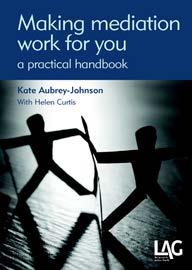



Louise is the manager of a busy customer services team. A key team member has been on sick leave for several months. Louise stays late to cover the work and has become increasingly stressed and exhausted. She has tried to raise it with her boss, Deborah, but feels nothing has been done to address the situation. Deborah had a good working relationship with Louise, but feels this has deteriorated over recent months. In their regular meetings, Louise is monosyllabic and unwilling to communicate. Deborah has suggested ways in which Louise could manage the team, but she feels her advice as fallen on deaf ears. Louise can be a bit of perfectionist and refuses to reallocate work to other colleagues.
Their working relationship has become strained to breaking point. They come to Acas for mediation.
I meet with Louise and Deborah separately. They are at their wit’s end; both of them are struggling to focus on their jobs and don’t see a way out. They are experienced and capable professionals, but things have degenerated to such an extent each admit that they have considered resigning.

At Acas we use a facilitative style of mediation. My job as the mediator is to help Louise and Deborah:

• Talk about the issues
• Understand the impact of their actions on one another
• Clarify their needs
• Work towards a mutually acceptable solution
I’m not there to make a decision about who’s right or who’s wrong. Passing judgement may result in temporary cease-fire but rarely leads to a lasting peace.
Supporting parties to find their own – rather than an imposed – way forward is vital in building a sustainable resolution to a conflict. This can be daunting for people initially. The idea of sitting in the same room together, let alone reaching an agreement, feels challenging at the start of a mediation. But for those willing to give it go, it can be an empowering experience. Mediation is a voluntary and confidential process which enables parties to deal with the past and take responsibility for the future.
As for Deborah and Louise, they came away from their mediation with a better understanding of each other and an agreement to help keep their working relationship on track.
You can get free advice at www.acas.org.uk


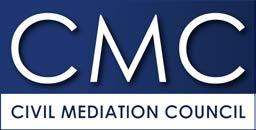
How to Master Commercial Mediation NEW BOOK
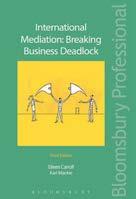
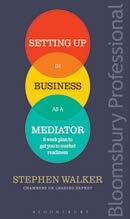
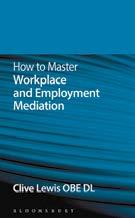
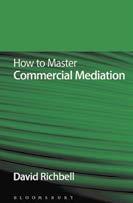
David Richbell with a team of specialist contributors
9781780436821
December 2014 | Paperback + CD ROM
£80.00 + 10% VAT £72.00 + 10% VAT
How to Master Negotiation NEW BOOK
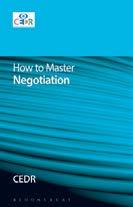
CEDR
9781780437965
September 2015 | Paperback
£55.00 £49.50
How to Master Workplace and Employment Mediation
NEW BOOK
Clive Lewis OBE DL 9781780437941
July 2015 | Paperback
£75.00 £67.50
Mediation Advocacy: Representing Clients in Mediation NEW BOOK
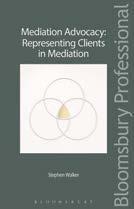
Stephen Walker
9781780437927
February 2015 | Paperback
£70.00 £63.00
Setting Up in Business as a Mediator
JANUARY 2016
Stephen Walker
9781780439938
December 2015 | Paperback
£80.00 £72.00
ONLINE DISCOUNT!
Mediation: An A-Z Guide

OCTOBER 2016
Stephen Walker
9781780439969
October 2016 | Paperback
£19.99 £17.99
International Mediation: Breaking Business Deadlock
NEW EDITION
Eileen Carroll QC (Hon) & Dr Karl Mackie
9781784512453
July 2016 | Paperback
£54.99 £49.99
The Psychology of Conflict: Mediating in a Diverse World FEBRUARY 2016
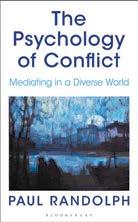

Paul Randolph
9781472922977
February 2016 | Paperback
£30.00 £27.00
Mediation: A Psychological Insight into Conflict Resolution


Freddie Strasser, Paul Randolph
9780826475039
August 2004 | Paperback
£25.99 £23.39
“Early Resolution” provides answers to what were thought to be insoluble problems in two main arenas: –
(1) How can you mediate sensibly before each party knows what the other will say and has seen the evidence to back the case (or defence) put forward?
(2) How can disputes be resolved proportionately where there are multiple parties under chain contracts with or without the added complication of differing law and jurisdiction clauses?
“Early Resolution” addresses these and other problem s enabling parties to resolve their disputes at the earliest possible stage and get on with their business.

It is axiomatic that business disputes are a drain on resources, divert senior management time and risk destroying the important business relationships which have perhaps taken years and substantial resources to build up.
Traditionally the choice has been litigation or arbitration with mediation as the new entrant.

The costs, delays and damage to business relationships which can result from hard fought court or arbitration proceedings are well known and I will say nothing further about that for now.
Mediation is a force for good and is strongly encouraged by the English courts. Indeed, I have suggested that arbitrators have the same powers as judges to stay proceedings and impose costs sanctions where one party unreasonably declines to mediate.So, it may be thought, there are the meat, fish and vegetarian options – what more is needed?
Mediation is indeed highly effective. Reliable data suggests that approaching 90% of mediations are successful and result in a settlement.
The problem is that many mediations take place late in
the day – after considerable costs and delays have already occurred.
Why is this? Well, disputes put parties on opposite sides of the table and locking horns. Disputes tend to breed mutual distrust and therefore parties focus on their stated positions, rather than collaborating to find shared interests. In short, each party will focus on building his Claim or Defence, as the case may be, and the Court or Arbitration setting can make it very difficult for parties to communicate with each other.
If mediation takes place late in the day (after pleadings/ submissions, disclosure and perhaps exchange of witness statements) then two of the key advantages of mediation – speed and cost – have been squandered. It has been said that in some cases the parties spend 20% of the overall costs to gather 80% of the evidence and then the balance of 80% is spent dredging up the final 20% of the evidence which rarely makes a substantial difference to the outcome! Added to this is the fact that most commercial disputes are resolved before final court judgement or award.

If mediation is attempted too early, before each party has a sufficient understanding of its own and its opponent’s case, then the mediation may well fail.
How is it that the Early Resolution can enable mediation to happen earlier and yet retain its high success rate?

A neutral third party “resolver”, working together with the parties appointed lawyers &/or claims handlers can enable costly paralysis to be overcome. In the adversarial setting of Court or Arbitration proceedings a proposal from one side is often viewed with distrust by the other side. However, a neutral resolver can explore with each party in strict confidence possibilities to move matters forward in the best interests of all parties to the dispute.
It is important to stress that this neutral resolver will not disclose what he learns from one party without the express authorisation of that party. This therefore creates a safe setting in which the resolver can explore the overlapping interests which may unite the parties and enable them to collaborate to resolve the dispute.
When and how is a neutral resolver to be appointed? The answer to “when” is as soon as dialogue has dried up and the parties feel locked into the treadmill of formal proceedings. The answer to “how” is by agreement of the parties or just by one party with the initial mandate to seek 'buy-in’ from the other party or parties.
[The latter can be especially useful in a multi-party or chain contract scenario where there may be 'limping’ jurisdiction and/or proper law clauses – for example, each contract in the chain providing for either arbitration or litigation in perhaps different countries and governed by different laws.
That said, the possibility to have a neutral resolver 'broke’ the process can be invaluable even in a two-party dispute.]
• Explore with each party its case and the indispensable minimum further information and/or documentation which may need to be collected to enable constructive discussions to occur [bearing in mind in this context that business people are content to hold serious discussions with far less documentation than most lawyers would want to carry in to a court or arbitration hearing.]
• Work out a mutually agreed “shopping list” or a clear “road map” which will enable the parties to identify their options for resolving or, alternatively, for contesting such issues as remain
The outcome of resolver’s intervention may well be a mediation hearing – but that mediation hearing will take place at a much earlier time in the life cycle of the dispute than would otherwise be the case.
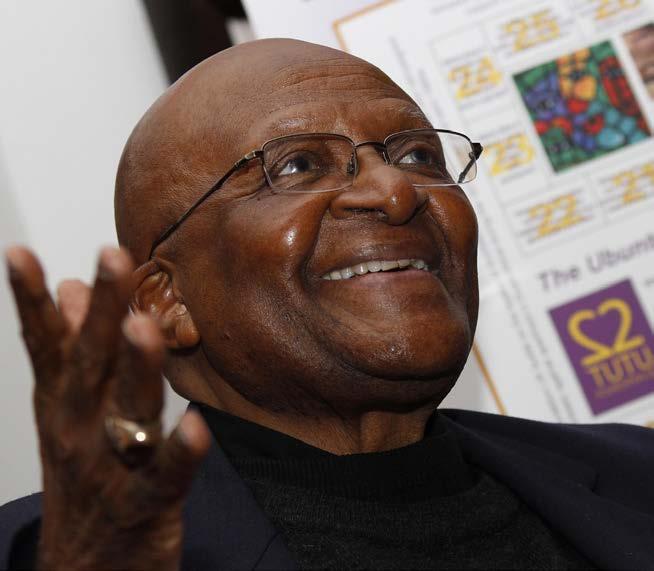


 By Colin Manning, Conference Chair, Civil Mediation Council
By Colin Manning, Conference Chair, Civil Mediation Council
onference titles are notoriously challenging to craft. Ours emerged from a consensus around communicating the wider benefits to society of using mediation and to reflect the outward looking purpose of the newly restructured Civil Mediation Council. Nevertheless, a title does not the conference make.
Our aims were to update our members on the current state of and developments in mediation practice in the UK and beyond, and to explore how mediators might best meet the needs and aspirations of users of mediation. We brought together a wealth of talent and experience to enhance the learning of our participants.
Chair, Sir Alan Ward summarised how the CMC was adapting to the challenges of a highly competitive mediation market and how the CMC was implementing “light touch” regulation, to an expanding membership of both mediation service providers and individual Registered mediators.

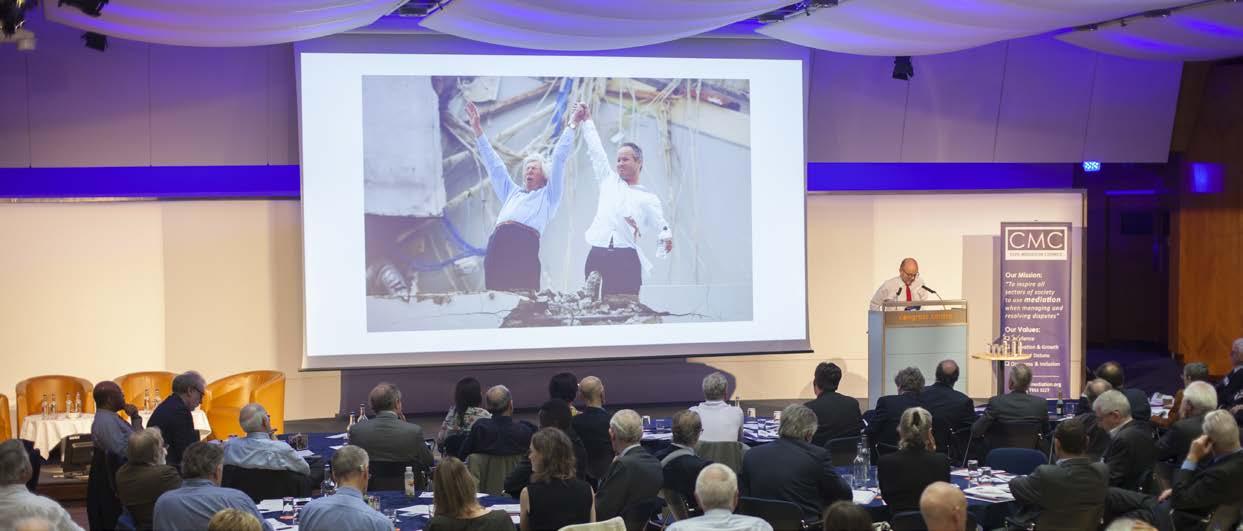
Bill Wood cantered engagingly through recent and continuing developments in mediation, from government and European perspectives, and highlighted the realistic possibility of automatic referral for civil and commercial disputes in a similar procedure to that operating in family disputes: a version of MIAMs.
Geoff Sharp, a leading New Zealand and international mediator, through the prism of the horrific aftermath of the Christchurch earthquake in 2011, gave a graphic and moving account of the successful and speedy application of mediation to disputes which would otherwise still be awaiting redress through the courts.
Graham Massie, presenting CEDR’s Biannual Audit of commercial mediator attitudes and experience in England and Wales, reported a small increase in the number of reported mediations (10,000, from 9,500 in 2014). There is a trend emerging from commercial clients and advisers making referrals directly to their chosen mediator, rather
than through a provider. Lawyers rank professional reputation, by experience/status and mediation style as the two most significant factors in determining mediator appointments, and there is an increase in the number of female mediators.
There were lessons for us all in a highly informative session, conducted by Bill Marsh, recipient of the Archbishop of Canterbury’s inaugural award for outstanding services to reconciliation. Bill lead a stimulating conversation with Julian McGuiggan, Rebecca Clark and Stephen Ruttle, exploring factors which made mediators mediate and users use mediators. This gave valuable insights into their respective expectations, highlighting less passivity, greater innovation and, sector expertise. Stephen explained his engagement in developing mediation skills to the interfaith arena, and beyond, encouraging people of differing views and beliefs to understand each other’s positions, learning to “disagree well”.
The conference is, above all, an opportunity for learning and to meet that aim, we offered four different workshops: “Knotty Problems” in mediation, an opportunity to explore difficult challenges and understand the impact of choices in context; an interactive forum around workplace and employment mediation practice; dispute avoidance and strategies to leverage the benefits of hindsight; and a very lively session from ex-BBC producer, Esther Stanhope on how to market yourself when you hate marketing.
Grateful thanks to the magnificent preparation and delivery from all our contributors.
 By Graham Massie, Mediator and Director of CEDR
By Graham Massie, Mediator and Director of CEDR
EEvery two years, as part of its public mission, the Centre for Effective Dispute Resolution conducts an audit of the commercial mediation field in the UK. Alongside the survey of mediators, CEDR conducted a parallel survey of lawyer attitudes in order to provide a client-oriented perspective to some of the questions raised.
It is important to emphasise that this is a survey of the civil and commercial mediation landscape, a field very loosely defined as encompassing any and all mediation activity that might reasonably fall within the ambit of the Civil Mediation Council. This reflects the background of the surveying organisation, CEDR, and the channels through which survey responses were canvassed (it does not, therefore, claim to cover either community or family mediation).

On the basis of mediators’ reported caseloads, we estimate that the current size of the civil and commercial mediation market in England & Wales is in the order of 10,000 cases per annum. This is just 5.2% more than the 9,500 cases we estimated in 2014, suggesting that there has been a slowing down of growth in the overall marketplace over the past two years, as growth has been of a higher percentage in earlier audits.
This conclusion may not, however, reflect the experience of many mediators or mediation service
providers. This is because it appears that the shape of the market is undergoing some change – the distinction between direct referrals and service providers is starting to disappear as some mediators move into selforganised groupings for marketing purposes. Clearly, therefore, there are winners and losers – when the Civil Mediation Council’s own survey asked its provider members whether mediations were harder to come by, 42% reported that conditions were harder, whilst 33% reported an improvement.
Although the overall success rate of mediation remains constant, with an aggregate settlement rate of around 86%, there is a variation from previous years’ audits in how those settlements are achieved. The proportion of cases that achieve settlement on the day of mediation has fallen from 75% to 67%, but this decrease has been offset by an increase in the proportion of cases that settle shortly after mediation, rising from 11% to 19%.
We asked mediators to provide a breakdown of the number of hours they spent on a typical mediation. This revealed that the average time spent has increased by over 2 hours, or 13%, since the 2014 Audit.
The change in the pattern of settlement rates could well suggest that cases are becoming harder, with parties needing longer time to reach agreement [and possibly this reflects a trend where lawyers are getting
We also asked Lawyers for their views on the mediators they had encountered and worked with in mediations:
• 81% (2014: 82%) of mediators were reported as performing quite well or very well, with 60% (2014: 53%) in the highest category.
• 14% (2014: 12%) were reported as performing adequately.
• 5% (2014: 6%) performed less than adequately, of which 1% (2014: 2%) were rated as being very poor.
We asked mediators to identify which types of dispute or sector of business would see the most growth in mediation usage over the next two years. Many felt that the mainstream areas of general commercial disputes still had a lot of growth potential, but Employment/Workplace, Professional Negligence and Personal Injury were the most frequently mentioned sectors. Family mediation was also identified as a potential growth area.
Finally, by combining the results of the Mediator Audit surveys with detailed operational statistics taken from CEDR’s own caseload, we have updated our assessment as to the overall economic impact of the commercial mediation field as a whole:
• The total value of cases mediated (i.e. the amount at issue) can be significantly influenced by the impact of mega-cases. If, however, the effect of such cases is excluded, the value of cases mediated each year is approximately £10.5 billion (2014: £9 billion).
• Since 1990, effectively the launch point of civil and commercial mediation within England & Wales, the total value of mediated cases is approaching £85 billion.

• By achieving earlier resolution of cases that would otherwise have proceeded through litigation, the commercial mediation profession this year will save business around £2.8 billion a year in wasted management time, damaged relationships, lost productivity and legal fees.

• Since 1990, our profession has contributed savings of £22.6 billion.
By way of a comparator to these figures, our Audit results suggest that the aggregate value of the mediation profession in terms of total fee income is around £26.5 million.
 By Dr Chris Danbury – Consultant Intensive Care Physician,
By Dr Chris Danbury – Consultant Intensive Care Physician,
 Fellow in Health Law and Mediator
Fellow in Health Law and Mediator
Intensive Care Medicine has developed over the last 60 years since the polio epidemic in Copenhagen in the late 1950s. As it has developed, so the public expectation of what can be achieved has increased. In the UK, 70% of patients who are admitted to ICU survive to discharge from hospital. However, it is known that admission to ICU carries profound consequences both physical and psychological. There are also psychological consequences to the family of people admitted to ICU.
Deaths on ICU are usually expected. The Ethicus1 paper shows that 70% of deaths have some form of treatment limitation/treatment withdrawal decision. The Conflicus 2 paper demonstrated that ICU staff report up to 80% of decisions regarding end-of-life involve some degree of conflict. This conflict may be staff/staff, staff/relatives or relative/relative.
Who should decide on which treatment is appropriate for a patient? Over the last few years, when disagreement arises between patient/family and the treating clinicians it appears to be more common to seek the Court’s opinion. Whether this is a real phenomenon is unclear, but, if true, may represent a change in attitudes towards healthcare, perhaps ‘Dr Google’ is providing patients and their families the information to allow them to question received medical wisdom. When litigation occurs, the Courts seem to prefer the family evidence to that of healthcare professionals. An explanation may be that the Court considers that the family/friends have known the patient over a long time, whereas the health professional has, usually, only known the patient for a matter of months.
What, therefore, should we do? Is it now the case that we should defer to our patients and their representatives in all situations where there is disagreement? I do not believe so, but do believe that full and frank discussions must occur when misunderstandings start. It is also important not to appear to conflate ‘best interests’ involving limitation of treatment with either resource allocation decisions or the professional’s own ethical stance.
Instead of Court, I propose Mediation. This can be done informally, perhaps by getting another clinician within the institution to act as an ‘honest broker’. If this fails then a formal mediation process can be initiated with legal representation on both sides. Mediation costs a great deal less than going to Court and can preserve the relationship between clinical team and their patient/representatives, which can otherwise be severely damaged by the rigors of Court proceedings. Although the Courts are always there, I believe that most problems that arise from the Mental Capacity Act are potentially amenable to mediation.
A time to talk, not litigate?
The Mediators’ New Breakfast Club (not so ‘New’ as it has been running for over four years) meets every other month (usually on the 2nd Wednesday of January, March etc) and is run by Michael Cover, Dave Owen and David Richbell. The aim is to give mediators from every sector and of varying experience to meet, network and learn (from each other and from the speaker).
Several hundred mediators (Commercial, Family, Community, Workplace and Faith Community) have attended in the past and between 40 and 60 people usually attend each meeting. The attendees range from people who have just accredited to those that do nothing else other than mediate, and cover all types of mediation. As with any Mediator gathering it is always a very cheery occasion and well worth the effort of rising early.
Apart from the friendly people, a bonus is that attendance counts for CPD for the CMC (Civil Mediation Council) and others.

Meetings are held at the Punch Tavern, which is at the Ludgate Circus end of Fleet Street in London (Googleable).
We start at 08.30 and usually finish around 10.00 although many people carry on afterwards, if only to have a bacon butty!
We have a speaker who is usually well known in the mediation community to talk about an issue of interest to the mediation community for about 1 hr. and it is an ideal opportunity to meet other mediators and compare notes. Speakers this year have included David Douglas (Independent Mediators) on marketing mediation services, Jay Walsh (JAMS) on mediation in the USA, Stephen Walker on building a mediation business and Andrew Acland (environmental Mediator).
There is no "formal" membership – just being on the invitee list and being prepared to pay (£5 at the moment) on the door for coffee/tea, fruit, pastries etc. is all that is necessary. Non-mediators such as lawyers and users of mediation are also welcome.
If you do not already receive flyers for the meetings, please e-mail Dave Owen (dwo@pengaron.co.uk) and say that you would like to be added to the list.

Any of us might find ourselves caught up in a dispute, whether from work problems, or in our private lives. Most people want to find a solution as quickly, cheaply and easily as possible. Litigation is rarely that solution: disputes can take over parties’ lives and the cost is high, in terms of money, time and wellbeing. Whatever the value or the complexity of the dispute, it is likely to be suitable for mediation. If a solution is reached, as it usually is, mediation will have saved significant amounts in legal costs and anxiety.
Civil mediation is a voluntary process. The first stage is to engage the other parties. Sometimes one party proposes mediation; sometimes a Judge will suggest it. Mediation can happen at any point: before litigation is commenced, or any time up to trial. Obviously the earlier mediation takes place, the greater the saving of potential legal costs.
A mediation provider can explain how mediation works and its advantages and liaise between the parties when arranging a mediation. Mediation is always confidential, which is attractive for parties wishing to avoid publicity and/or protect their reputation. Once everyone has agreed to mediate, the parties will agree on the identity of a mediator.

Preparation for mediation is important. The parties agree which documents they wish the mediator to see. Usually the mediator only needs a small bundle containing the issues and any relevant legal documents. Parties are also asked for a short position statement in advance of the mediation which is exchanged between the parties. It includes the party’s current view of the dispute, the impact it is having on them and any ideas for possible solutions. Additionally, confidential information can be sent by one or other party to be seen only by the mediator.
What is discussed in the mediation remains confidential and cannot be referred to in subsequent court proceedings. The mediator is a neutral facilitator, not a judge and does not give legal advice. His or her job is to enable parties to take decision-making into their own hands so as to find
their own solutions. The mediator encourages constructive discussion, listens and helps shift parties’ perceptions.
A mediation can be completed in one day, sometimes four hours will be sufficient. It usually begins with a joint meeting of all parties and their lawyers if instructed. At that opening session, the mediator outlines the process. Each party explains their perspective of the dispute to the other. Once any immediate questions have been answered and there are no other matters to be explored, the parties move to private rooms where they speak to the mediator privately and confidentially. The mediator then ‘shuttles’ between rooms helping the parties to identify areas of overlap and consensus.
The most important factor that leads to a settlement is the parties’ genuine desire to resolve their differences. The possible solutions available are much more flexible than they would be at trial. Outcomes might have a practical, financial, or emotional (an apology) emphasis and can take into account an individual’s circumstances. If the parties wish, any final agreement is written up and signed in a legally binding document which is then enforceable. Where parties have reached their own agreement, enforcement proceedings are rarely if ever needed. Where there is no agreement reached, the issues will inevitably have narrowed and settlement can follow subsequently.
Approximately 70% of mediations settle. The process is co-operative rather than adversarial, and as a result, relationships between the parties afterwards are generally much better than after a court case. The fact that the parties have made decisions for themselves means that they are often more satisfied with the outcome and able to move on. It is common for parties who experience mediation to report that they wish they had known of it earlier, so as to avoid the cost and stress of litigation.
There are financial reasons for preferring mediation to going to court. The increase in court fees – now £445 in order to issue a claim worth over £5000 – and the fact that legal fees rapidly escalate make the cheaper, quicker option of mediation very attractive. The cost of mediation is commonly less than 10% of a court case.
Courts encourage people to resolve their disputes themselves wherever possible. Sometimes, courts make detrimental costs orders where parties have ‘unreasonably refused’ to mediate. In the family courts, consideration of mediation, with the help of a mediator, is compulsory before a case can start.
Many fully accredited mediation providers are listed on the Ministry of Justice’s civil online directory. Accredited family mediators can be found via the Family Mediation Council website. Some providers provide both civil and family mediators. We urge those in a dispute to try it before investing in the legal remedy – what is there to lose?

TRAINING PROVIDERS


Established in 1986, Southwark Mediation Centre is one of the oldest mediation services in the country. This year we are proud to be celebrati ng 30 years!
During the first ever UK Mediation Awareness Week we will be celebrating with a daytime event on Monday 10th October at The Guildhall in the City of London. We would love you to join us and our partners to hear about our achievements over the past three decades and to find out more about our award-winn ing community, workplace, peer and family mediation work across London.
For more details and to register your interest please email us on: admin@southwarkmediation.co.uk
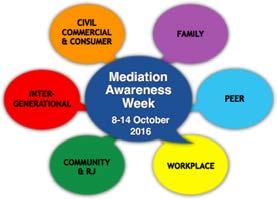
CEDR
CLERKSROOM MEDIATION
CMP RESOLUTIONS
CONSENSUM
CORE SOLUTIONS GROUP
EMPIRE
FOCUS MEDIATION
GARDEN COURT MEDIATION
GLOBIS
CEDR
t: +44 (0)20 7536 6060
e: adr@cedr.com

w : www.cedr.com
LLP
INDEPENDENT MEDIATORS
J B MEDIATION SOLUTIONS
JAMS INTERNATIONAL
JONATHAN LUX
KINGSWAY LAW
MEDIATION IN THE WORKPLACE LTD
MELROSE MEDIATION
NAVEEN AGNIHOTRI
Europe’s largest independent commercial and workplace dispute resolution provider: CEDR has worked with over 100,000 parties in commercial disputes and helped resolve over 300,000 consumer complaints across 30 sectors. A select few of the individuals CEDR trains progress to join the CEDR Mediation Panel, which currently comprises 200 mediators speaking 15 different languages.
CONSENSUM
PAMELA LYALL MEDIATOR AND FACILITATOR
PAUL RANDOLPH
AT REGENT’S UNIVERSITY LONDON
PEACEFUL RESOLUTION
REGENT’S UNIVERSITY LONDON
5 DAY MEDIATION SKILLS COURSE
SHERIDAN RESOLUTIONS LTD
STILLHR
IMRAN SALIM - WHITESTONE SOLICITORS
WANDSWORTH MEDIATION SERVICE
t: +44 (0)7831 229 122
e: julian@consensum.org
w: www.consensum.org
Contact: Julian Roskill
We are mediators and coaches and have been handling disagreements and facilitating with people and organisations for many years. We can pinpoint the real problems that lie behind business issues in many industries. Our team of mediators and coaches come from a range of professional disciplines. At the heart of our work as mediators lies engaging effectively with those involved, understanding what lies beneath the surface of the disagreement and helping you reach a successful mediation outcome, in a way that is quicker and more productive than you might expect.
CLERKSROOM MEDIATION
t: +44 (0)1823 704 099
e: mediation@clerksroom.com
w: www.clerksroom.com
a: Equity House, Blackbrook Park Avenue, Taunton, Somerset TA1 2PX
Clerksroom Mediation is a leading National CMC Accredited Provider offering a choice of over 500 mediators. We are able to offer civil mediators to suit every dispute complexity, location and budget You will benefit from our National Mediators Database along with efficient administration provided by experienced and dedicated clerks.
CORE SOLUTIONS GROUP

t: +44 (0)131 524 8188
e: info@core-solutions.com
w: www.core-solutions.com
For fifteen years, Core has provided a comprehensive mediation service at the highest levels in commercial, business, management, public sector and other disputes. Led by highly-ranked John Sturrock QC, we work throughout the UK and beyond, providing a high quality, independent mediation and facilitation service, as well as specialist coaching and training.

CMP RESOLUTIONS
t: +44 (0)1763 852 225
e: info@cmpresolutions.co.uk
w: www.cmpresolutions.co.uk
a: Low Farm, Brook Road, Bassingbourn, Hertfordshire SG8 5NT
Contact: Richard Peachey
Set up in 1989, so no newcomer to the market, CMP is a national provider of mediation services. Our mediators each have more than 10 years’ experience in workplace mediation. We have five models of mediation available, so that any situation can be resolved through mediation. We have a national presence, diverse mediators, a 24-hour turnaround, and a 96% success rate. So call CMP Resolutions - the mediation experts.
EMPIRE
t: +44 (0)1224 701 383
e: e.masson@empirehr.com

w : www.empirehr.com
a: 117 Grandholm Drive, Bridge of Don, Aberdeen AB22 8AE
Contact: Elaine Masson
Our mediators are registered with the Scottish Mediation Network and meet the stringent professional standards set by that organisation. We provide flexible, pragmatic and commercial support to help clients and parties identify practical solutions to workplace conflict, whether complex disputes, personality conflicts, support following conclusion of formal procedures and facilitating return to work after stress related absence.

FOCUS MEDIATION
t: +44 (0)1908 231 132
e: mary@focus-mediation.co.uk
w: www.focus-mediation.co.uk
Contact: Mary Banham-Hall
Focus Mediation was established in 1999 and has grown steadily by providing excellent specialist mediation. Our experienced mediators come from a wide range of professional backgrounds, ensuring you can choose the right person for your dispute. We are able to help you with small and large workplace and employment problems, as our workplace team can tailor their service to suit your needs thereby saving you management time and costs.
GARDEN COURT MEDIATION

t: +44 (0)20 7993 7600
e: mediationclerks@gclaw.co.uk
w: gardencourtmediation.co.uk
a: 57-60 Lincoln’s Inn Fields, London WC2A 3LJ
Contact: Lavinia Shaw-Brown
We offer a flexible, high-quality workplace mediation service from the initial inquiry through to finding agreement. We have a team of experienced professional mediators with developed interpersonal skills. Our aim is to help you find a resolution to the dispute as quickly and effectively as possible.
GLOBIS
t: +44 (0)330 100 0809
e: clive.lewis@globis.co.uk
w: www.globis.co.uk
a: Ground Floor, 26 Eccleston Square, London SW1V 1NS
Contact: Clive Lewis OBE DL
Globis Mediation Group is one of the UK’s longest established providers of workplace mediation services. Applying business psychology, Globis has helped thousands of people at hundreds of organisations resolve conflict situations successfully. These interventions have saved millions of pounds. With a success rate of 90.7% it is no wonder organisations return to Globis for support many times over. Get in touch now to find out how our 7 stage mediation commissioning process can help your organisation benefit from our first class workplace mediation services.


t: +44 (0)1206 217 133
e: mediation@gleamed.co.uk
w: www.gleamed.co.uk
a: 63 West Stockwell Street, Colchester CO1 1HE London Office also available
Contact: Tom Thomas
GLEAMED provides civil/commercial, workplace/employment, family, and community mediation in East Anglia and London, referred by individuals, lawyers, firms/organisations and courts. We handle contractual, property, boundary, rental, child contact, divorce, workplace and many other types of dispute and offer international mediation, working with The Human Right Centre at University of Essex.
IMRAN SALIMWHITESTONE SOLICITORS

t: +44 (0)1706 645 600
e: isalim@whitestonesolicitors.co.uk
w: www.whitestonesolicitors.co.uk/mediation
a: Whitestone House, 2 West Street, Rochdale OL16 2EN
Imran is a Solicitor and civil & commercial mediator. Imran deals with all types of civil/commercial disputes, such as partnership disputes, contract disputes and debt recovery. Imran can help you find a solution quickly and cost-effectively, even if Court action is under way.
INDEPENDENT MEDIATORS

t: +44 (0)20 7127 9223
e: admin@independentmediators.co.uk
w: www.independentmediators.co.uk
Leading UK and international mediation chambers consisting of nine highly experienced mediators; Charles Dodson, Phillip Howell-Richardson, Kate Jackson, Michel Kallipetis QC, Jonathan Lloyd-Jones, Mark Lomas QC, Bill Marsh, Andrew Paton and Nicholas Pryor. Mediating commercial and civil disputes, the number of mediations per year has consistently increased and now numbers 500+ per year. Since launch in 2007 the group has received in excess of 3750 appointments.

J B MEDIATION SOLUTIONS

t: +44 (0)800 612 2846
e: Janine@jbmediationsolutions.co.uk
w: www.jbmediationsolutions.co.uk
At JB Mediation Solutions, we offer a fresh approach to ADR. Not legally driven, we offer our clients a platform to resolve disputes in an environment and in a manner that suits all parties. We offer competitive rates and are available to attend mediations throughout the South East, with around 2 weeks notice. For an informal discussion about how mediation can work for you, please give us a call or send us an email
JAMS INTERNATIONAL
t: +44 (0)20 7583 9808
e: mrushton@jamsinternational.com
w: www.jamsinternational.com
JAMS International is part of JAMS, the world’s largest private provider of ADR services. From its London office, JAMS International provides arbitrators and mediators for cross-border and UK domestic disputes across a full range of industry sectors and practice areas.
JONATHAN LUX
t: +44 (0)7876 232 305
e: Jonathan.Lux@stonechambers.com
w: www.stonechambers.com/barristers/ jonathan-lux.asp

Jonathan’s wise guidance, flexible approach and excellent communication skills make him the right choice for any contentious or straightforward mediation case. He is a fluent French and German speaker making him much in demand for national and international mediations. He is accredited by the International Mediation Institute and is a founder member of CEDR. He has handled many mediations and has lectured widely and written numerous articles on the subject of mediation, and is co-author of ADR and Commercial Disputes.
KINGSWAY LAW
t: +44 (0) 7825 894 893

e: larry.george@kingswaylaw.uk
w: linkedin.com/in/larry-george-b9114a46
a: P.O. Box 516, Cambridge CB1 0BD
Contact : Larry George
Qualified solicitor; CEDR accredited mediator, 2010. Larry has 30+ years of experience as a commercial legal adviser advising on corporate and commercial matters. He has specialised in the oil business including oil trading but also has a great deal of experience in general commercial areas including in contracts, terms of trade and related disputes. Mediation experience includes franchising, engineering contracts and professional negligence. Larry has wide international experience and is a fluent Russian speaker.

MEDIATION IN THE WORKPLACE LTD


t: +44 (0)7932 150 453
e: sarah@mediationintheworkplace.co.uk
w : www.mediationintheworkplace.co.uk
a: 21 Erleigh Drive, Chippenham, Wiltshire SN15 2NQ
Contact: Sarah Crayford Brown
We specialise in individual and group disputes: we help parties to find agreement before formal options are needed; to move on from investigations; and to return to the workplace after absence caused by conflict. We also provide a range of mediation training options to suit your needs. Our mediators are experienced, specialist workplace mediators and conflict coaches ready to help and advise you on the best options for your concern.
MELROSE MEDIATION
t: +44 (0)7786 406 799
e: bridget@melrosemediation.co.uk
w : www.melrosemediation.co.uk

Contact: Bridget Melrose
I am an accredited civil mediator and solicitor with over 25 years of experience of civil litigation with a Masters in Dispute Resolution.
I am acutely aware of the emotional, monetary and time costs that litigation brings to a dispute. I can offer a real alternative, allowing for preservation of relationships and reaching outcomes not open to a court to order. I can empathise with parties to a dispute whilst managing expectation. My experience and skill set lends itself to mediation as a means of dispute resolution.
NAVEEN AGNIHOTRI
t: +44 (0)23 8020 5757
e: nagnihotri@12cp.co.uk
w: workplace-mediator.co.uk
a: Chambers of Nicholas Haggan QC
12 College Place Fauvelle Buildings

Southampton SO15 2FE
Contact: Naveen Agnihotri
Naveen has helped parties resolve disputes as a mediator since 2002. He is accredited by CEDR and the ADR Group. Naveen has successfully mediated over 200 cases and is listed in the top-t ier of Commercial Mediators by the Bar Council. He is a specialist Wor kplace Mediator and is CMC Registered. Naveen is happy to discus s any matter without obligation and is flexible as to mediation v enue.
PAMELA LYALL MEDIATOR AND FACILITATOR
t: +44 (0)7778 384 150
e: pamela@pamelalyall.com
w: www.pamelalyall.com
Pamela is Scotland’s leading female commercial mediator. Formerly a litigation partner and Head of Insurance Litigation at one of Scotland’s largest law firms, she has mediated in over 200 disputes concerned with commercial contracts, employment and discrimination, senior management, workplace, health services, professional negligence, intellectual property, building and construction, partnership, property, charitable organisations and other disputes.
PAUL RANDOLPH
AT REGENT’S UNIVERSITY LONDON
t: +44 (0)20 8339 0767
e: randolphp@regents.ac.uk
w : www.regents.ac.uk/RSPP
A leading mediator, trainer and writer, whose approach adopts a subtle focus on the psychology of conflict. He has mediated successfully in a wide variety of disputes, including commercial, workplace, family property and finance, and professional negligence matters, but with particular expertise in conflicts with high emotional content.
PEACEFUL RESOLUTION
t: +44 (0)20 3695 2369
e: mail@peacefulresolution.co.uk
w: www.peacefulresolution.co.uk
a: London, England and Lisbon, Portugal
Contact: David Santiago
Cross-border Bi-lingual Mediation and Coaching. In room and on-line Mediation. Conflict Coaching. Mediation Training.
Mediação e Coaching de Conflitos internacional, on-line e presencial, formação de mediadores em Português e Inglês.
REGENT’S UNIVERSITY LONDON

5 DAY MEDIATION SKILLS COURSE
t: +44 (0)20 8339 0767
e: paul@paulrandolph.net
w: www.regents.ac.uk/mediate
a: Regent’s University London, Inner Circle, Regent’s Park, London NW1 4NS
Contact: Paul Randolph
Study the skills for conflict resolution and become an accredited mediator with our five-day course. At Regent’s our unique psychotherapeutic method of mediation training will equip you with a framework for conflict management and resolution crucial for dealing with commercial, employment, workplace, legal, industrial and personal disputes. We focus on providing a high standard of teaching from experienced tutors delivered in a quality environment.
SHERIDAN RESOLUTIONS LTD
t: + 44 (0)7970 167 060
e: caroline@sheridanresolutions.com
w: www.sheridanresolutions.com
Contact: Caroline Sheridan
Caroline has developed her reputation and Legal Directory-rated practice as a leading CEDR Chambers accredited Mediator across the full range of workplace and employment disputes.
With qualifications and experience also in psychometrics, psychotherapy, counselling, coaching and supervision, Caroline offers pre and post mediation coaching, mediator supervision and mediator skills development for managers and leaders.
STILLHR
t: +44 (0)7932 762 448
e: robert@stillhr.com
w: www.stillhr.com
Contact: Robert Still
Qualified workplace mediators. Robert Still and Olaleye Oladapo. Over 10 years’ experience across the UK. CMC Registered Mediation Provider 2016. Resolving individuals and team conflict.

‘Working with individuals and organisations to improve their workplaces and working relationships’
‘Working with individuals and organisations to improve their workplaces and working relationships’

t: +44 (0)20 7223 7744
e: wms@wandsworthmediation.co.uk
w: www.wandsworthmediation.co.uk
a: St Marks Durie Hall, Battersea Rise, London SW11 1EJ
Wandsworth Mediation Service (WMS) is a charity that was set up in 2004. We now offer 4 types of mediation; family, inter-generational, community and commercial. All of our mediations are undertaken by volunteer mediators who are all trained and qualified mediators committed to serving their local community. WMS is also involved with delivering a number of conflict resolution training courses within secondary schools in the borough.
www.stillhr.com
Call Robert Still: 07932 762448
www.stillhr.com
UK-wide, now based in West London and West Yorkshire!
Call Robert Still: 07932 762448
UK-wide, now based in West London and West Yorkshire!
CEDR
CMP RESOLUTIONS
CORE SOLUTIONS GROUP
FOCUS MEDIATION
GLOBIS
MEDIATION IN THE WORKPLACE LTD
PAUL RANDOLPH AT REGENT’S UNIVERSITY LONDON
PEACEFUL RESOLUTION
REGENT’S UNIVERSITY LONDON POSTGRADUATE
CERTIFICATE IN MEDIATION AND CONFLICT RESOLUTION STILLHR

CEDR
t: +44 (0)20 7536 6000
e: training@cedr.com
w : www.cedr.com
CEDR Mediator Skills and Workplace Training are five-day programmes of comprehensive tuition and participation in effective dispute resolution where participants are trained and assessed for CEDR Accreditation, internationally recognised as the standard of excellence. CEDR has accredited over 7,000 mediators in over 70 jurisdictions.

t: +44 (0)1908 231 132
e: mary@focus-mediation.co.uk
w: www.focus-mediation.co.uk

Contact: Mary Banham-Hall
Focus Mediation Training Division has a team of high profile trainers offering established and bespoke courses covering Negotiation and ADR Skills, Managing and Resolving Conflict, Difficult Conversations and Coaching and Mentoring on a one to one or team basis. Please contact Mary Banham-Hall for details of programmes, trainer profiles and costs.
GLOBIS
t: +44 (0)330 100 0809
e: clive.lewis@globis.co.uk
w: www.globis.co.uk
a: Ground Floor, 26 Eccleston Square, London SW1V 1NS
contact: Clive Lewis OBE DL
Globis Mediation Group has trained hundreds of HR Professionals, Lawyers, Trade Union Representatives, Line managers and independent consultants to be accredited workplace and employment mediators

Led by a highly engaged team of business psychologists, the training is highly effective and equips delegates with the skills required to mediate one to one and team disputes effectively. Last year, 96.2% of delegates rated our training 6/6. Real case studies bring the training course to life. The National Employment and Workplace Mediation Certificate is one of the UK’s longest running mediation training courses.
t: +44 (0)1763 852 225
e: info@cmpresolutions.co.uk
w: www.cmpresolutions.co.uk
a: Low Farm, Brook Road,Bassingbourn, Hertfordshire SG8 5NT
Contact: Richard Peachey
Set up in 1989, we have led the field of workplace mediation, setting up the UK’s first inhouse mediation service for Birmingham City Council. Since then we have set up over 200 services for employers large and small. We offer a range of accredited training, from short workshops to raise awareness, through national certificate in workplace mediation programmes, and advanced learning.

t: +44 (0)131 524 8188
e: info@core-solutions.com

w: www.core-solutions.com
Core’s flagship mediation training course is highly regarded across the UK and beyond. Tried and tested from years of experience in mediation and in some of the toughest negotiations, our internationally recognised team of coaches is led by senior mediator, John Sturrock QC. “It simply is the best course I’ve ever attended. The whole course was incredibly interesting, engaging and challenging!” - Participant from major bank. Register for Core’s 2016 Residential Summer School: Using Mediation Skills as a Leader, see website for more details.
MEDIATION IN THE WORKPLACE LTD

t: +44 (0)7932 150 453
e: sarah@mediationintheworkplace.co.uk
w : www.mediationintheworkplace.co.uk
a: 21 Erleigh Drive, Chippenham, Wiltshire SN15 2NQ
Contact: Sarah Crayford Brown
We offer bespoke workshops and National Mediation Qualificationsleading to a Certificate in Mediation Theory and Practice; or an Award in Understanding Mediation. Our programmes focus on workplace disputes and can be delivered in-house with or without the qualifications. Our trainers are practicing workplace mediators and we make use of professional actors to bring realism to the practical work.
PAUL RANDOLPH
AT REGENT’S UNIVERSITY LONDON
t: +44 (0)20 8339 0767
e: randolphp@regents.ac.uk
w : www.regents.ac.uk/RSPP
Paul is Course Leader of the Mediation Course at Regent’s University London – a unique course which approaches mediation training from a psychological perspective. The course focuses upon the psychological behaviour of parties in conflict, providing mediators with vital tools for resolving disputes in all legal, commercial, and social conflict areas.
PEACEFUL RESOLUTION
t: +44 (0)20 3695 2369
e: mail@peacefulresolution.co.uk
w: www.peacefulresolution.co.uk
a: London, England and Lisbon, Portugal
Contact: David Santiago
Cross-border Bi-lingual Mediation and Coaching. In room and on-line Mediation. Conflict Coaching. Mediation Training.
Mediação e Coaching de Conflitos internacional, on-line e presencial, formação de mediadores em Português e Inglês.

POSTGRADUATE CERTIFICATE IN MEDIATION AND CONFLICT
RESOLUTION
t: +44 (0)20 7487 7505
e: benjaminp@regents.ac.uk
w: www.regents.ac.uk/mediate
a: Regent’s University London, Inner Circle, Regent’s Park, London NW1 4NS
Contact: Philip Benjamin
Study the skills for conflict resolution and become an accredited mediator with our Postgraduate Certificate course. This part-time programme provides an added academic and theoretical approach to the practical aspects of conflict resolution and mediation, developing a broad understanding of the causes of and responses to conflict. Modules include Theories of Conflict, Applied Theory and Skills for Alternative Dispute Resolution.
STILLHR

t: +44 (0)7932 762 448
e: robert@stillhr.com
w: www.stillhr.com
Contact: Robert Still
The ‘first’ accredited workplace mediation training to be established in the UK, designed by PMR Ltd and receiving high acclaim since 1996. OCN Accredited 6-day programme; delivered in-house by qualified and practicing workplace mediator, Robert Still FCIPD.

‘Working with individuals and organisations to improve their workplaces and working relationships’
‘Working with individuals and organisations to improve their workplaces and working relationships’
www.stillhr.com
Call Robert Still: 07932 762448
www.stillhr.com
UK-wide, now based in West London and West Yorkshire!
Call Robert Still: 07932 762448
UK-wide, now based in West London and West Yorkshire!

